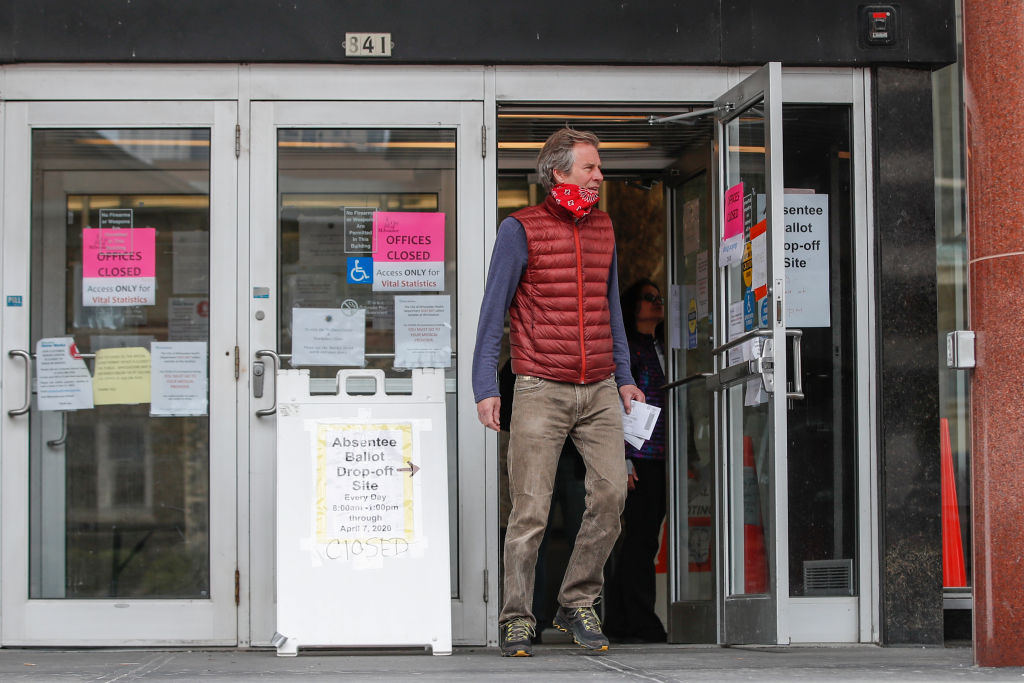U.S. Supreme Court sides with GOP on Wisconsin election, apparently rewrites state election law


A free daily email with the biggest news stories of the day – and the best features from TheWeek.com
You are now subscribed
Your newsletter sign-up was successful
Wisconsin's local elections and presidential primaries will likely proceed on Tuesday after the conservative majority on the Wisconsin Supreme Court struck down an executive order Monday from Gov. Tony Evers (D) to delay the election to June 9 due to the coronavirus outbreak. There are open questions about how many polling places will be open and how many people will be able to vote by absentee ballot. The U.S. Supreme Court ruled 5-4 on Monday night that Wisconsin voters must hand-deliver their absentee ballots by Tuesday evening or have them postmarked April 7, overruling a lower court that had extended absentee voting for six days.
The U.S. Supreme Court, like the state court, split along ideological lines, siding with the state and national Republican Party. In the dissent for the four liberals on the court, Justice Ruth Bader Ginsberg warned of "massive disenfranchisement" due to the conservative majority's "eleventh hour" intervention "to prevent voters who have timely requested absentee ballots from casting their votes." As of Monday, only 57 percent of the 1.3 million requested absentee ballots had been returned, The Associated Press reports, and "it’s unclear how many of the outstanding 539,000 ballots will be in voters' hands by Tuesday to meet the April 7 postmark deadline."
The court conservatives said Ginsberg's "entirely misplaced" dissent "completely overlooks" that the court is allowing the absentee ballots to be received by April 13, so long as they are postmarked April 7. But that changes Wisconsin election law, says Matthew DeFour, state politics editor for the Wisconsin State Journal.
The Week
Escape your echo chamber. Get the facts behind the news, plus analysis from multiple perspectives.

Sign up for The Week's Free Newsletters
From our morning news briefing to a weekly Good News Newsletter, get the best of The Week delivered directly to your inbox.
From our morning news briefing to a weekly Good News Newsletter, get the best of The Week delivered directly to your inbox.
The state Supreme Court — one of whose 5 conservative members recused himself because he's on Tuesday's ballot — said Evers lacked the authority to change the election date. Evers had called the GOP-controlled legislature into special session over the weekend to shift the date or switch to all-mail-in-ballots, like Ohio did, but the Republican leaders gaveled in and out of season without taking any action, NPR News reports. Thousands of poll workers have refused to participate in the election over COVID-19 fears; heavily Democratic Milwaukee, for example, will have just five polling sites, not its planned 180. The National Guard has been asked to help.
A free daily email with the biggest news stories of the day – and the best features from TheWeek.com
Peter has worked as a news and culture writer and editor at The Week since the site's launch in 2008. He covers politics, world affairs, religion and cultural currents. His journalism career began as a copy editor at a financial newswire and has included editorial positions at The New York Times Magazine, Facts on File, and Oregon State University.
-
 ‘Restaurateurs have become millionaires’
‘Restaurateurs have become millionaires’Instant Opinion Opinion, comment and editorials of the day
-
 Earth is rapidly approaching a ‘hothouse’ trajectory of warming
Earth is rapidly approaching a ‘hothouse’ trajectory of warmingThe explainer It may become impossible to fix
-
 Health insurance: Premiums soar as ACA subsidies end
Health insurance: Premiums soar as ACA subsidies endFeature 1.4 million people have dropped coverage
-
 NIH director Bhattacharya tapped as acting CDC head
NIH director Bhattacharya tapped as acting CDC headSpeed Read Jay Bhattacharya, a critic of the CDC’s Covid-19 response, will now lead the Centers for Disease Control and Prevention
-
 ‘Poor time management isn’t just an inconvenience’
‘Poor time management isn’t just an inconvenience’Instant Opinion Opinion, comment and editorials of the day
-
 Witkoff and Kushner tackle Ukraine, Iran in Geneva
Witkoff and Kushner tackle Ukraine, Iran in GenevaSpeed Read Steve Witkoff and Jared Kushner held negotiations aimed at securing a nuclear deal with Iran and an end to Russia’s war in Ukraine
-
 Pentagon spokesperson forced out as DHS’s resigns
Pentagon spokesperson forced out as DHS’s resignsSpeed Read Senior military adviser Col. David Butler was fired by Pete Hegseth and Homeland Security spokesperson Tricia McLaughlin is resigning
-
 Judge orders Washington slavery exhibit restored
Judge orders Washington slavery exhibit restoredSpeed Read The Trump administration took down displays about slavery at the President’s House Site in Philadelphia
-
 Kurt Olsen: Trump’s ‘Stop the Steal’ lawyer playing a major White House role
Kurt Olsen: Trump’s ‘Stop the Steal’ lawyer playing a major White House roleIn the Spotlight Olsen reportedly has access to significant US intelligence
-
 Hyatt chair joins growing list of Epstein files losers
Hyatt chair joins growing list of Epstein files losersSpeed Read Thomas Pritzker stepped down as executive chair of the Hyatt Hotels Corporation over his ties with Jeffrey Epstein and Ghislaine Maxwell
-
 Judge blocks Hegseth from punishing Kelly over video
Judge blocks Hegseth from punishing Kelly over videoSpeed Read Defense Secretary Pete Hegseth pushed for the senator to be demoted over a video in which he reminds military officials they should refuse illegal orders
